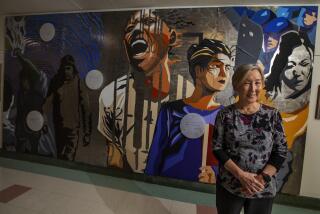Grant to Help UCI Pull Minority Kids Into Cancer Studies
ORANGE — The National Cancer Institute has awarded UCI Medical Center a grant intended to increase the number of minority children in cancer studies and to develop better relations between their families and physicians.
The three-year, $330,000 award to the Department of Pediatrics and the Clinical Cancer Center, announced by UCI on Monday, aims to offer Latino, African American and Asian children the benefits of the latest research and newest therapies not usually available outside major university cancer centers.
For the record:
12:00 a.m. Aug. 17, 1994 For the Record
Los Angeles Times Wednesday August 17, 1994 Orange County Edition Metro Part B Page 3 Column 5 Metro Desk 2 inches; 46 words Type of Material: Correction
Cancer Research--UC Irvine researchers are recruiting children with cancer from all ethnic groups, including Native Americans, for enrollment in clinical testing. In a story Tuesday, UCI officials mentioned only Latinos, Asians and African Americans. Potential participants can call Dr. Paul Zeltzer at (714) 456-8411.
UCI qualified for the grant because its pediatric patient population is more than 50% minority. The proportion actually is 68%, roughly equivalent to the percentage of minority children in Orange County. The only other medical center that won a grant this year was the University of Texas at San Antonio.
Historically, the UCI center, which sees about 30 to 35 new pediatric oncology patients a year, has been able to enroll only a handful of minorities in clinical trials, said Dr. Paul Zeltzer, the principal investigator involved in the grant. The hospital hopes to increase the enrollment of minorities to a minimum of 17 a year.
But the grant is about more than “accruing numbers,” Zeltzer said. It will help make physicians and families aware of how cutting-edge therapy can improve the outcome for the young patients.
Children treated as part of a clinical trial have a 20% to 40% better chance of survival than those who are not so enrolled, Zeltzer said. He stressed that the youngsters will not be “guinea pigs” subject to great risk; they will receive the best available treatments and will be offered the best chances for a cure.
“The standard of care for children with cancer is experimental therapy,” he said, in part because the field of research is changing so rapidly.
Dr. Otis Brawley, program director of the community oncology and rehabilitation branch at the National Cancer Institute in Rockville, Md., agreed.
“We firmly believe that when a disease is not 100% curable” the best treatment is to be in a study designed to “increase the number of cures,” he said.
Brawley said the grant will offer low-income people a chance they normally would not have to participate in state-of-the-art treatment. The care and medications provided during clinical trials generally are free.
*
More than eight of 10 child cancer patients nationwide are enrolled in some form of clinical trial. But minority children risk being excluded if their families are not aware of the opportunities available or if they face language or cultural barriers, Zeltzer said.
Zeltzer believes the language barrier in particular has inhibited minority enrollment at UCI. The grant money will allow the medical center to translate the study procedures and information about supportive care into various languages so family members know what they are getting into and can learn how to provide the best environment for children under treatment.
Social workers and others sensitive to different ethnic communities’ beliefs about health care, cancer and death will help the center reach out to minorities, Zeltzer said.
Community physicians will be involved in the treatment process as well, he said. The grant project will hook them up with the Children’s Research Group, a consortium of 30 centers nationwide with more than 60 studies in progress on pediatric cancer. The group can provide the latest information to doctors on advances in cancer treatment.
With family physicians part of the team, “there is a familiar face,” Zeltzer said. “Families feel more comfortable.”
Some physicians already are expressing interest in the project.
“It’s fulfilling a need and a void,” said Dr. Quynh Kieu, a Fountain Valley pediatrician who treats Asian patients primarily.
Kieu said her patients’ families commonly feel left out of the health care system. And the alienation becomes particularly pronounced when they are faced with cancer--a difficult diagnosis to accept.
“It’s important to be able to offer them culturally appropriate help, to soften the impact so they feel more in control and can help the child,” she said. “It’s very hard for them to give support to the patient unless they have some understanding of where the process is at.”
One of the goals of the grant project, Zeltzer said, is for UCI to compile enough information about children’s cancer among ethnic minorities to become a national clearinghouse. The study may help answer such questions about the prevalence of certain cancers among minority children and whether certain groups are more or less vulnerable than the general population, Zeltzer said.






